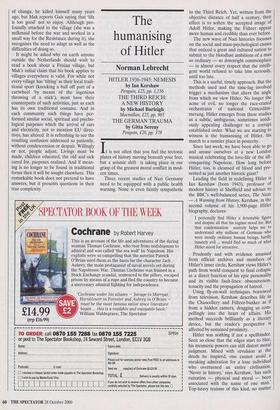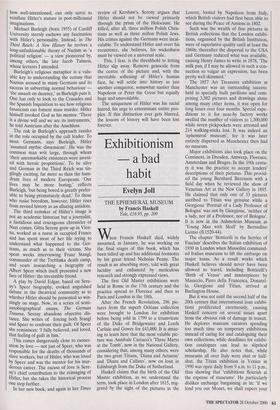The humanising of Hitler
Norman Lebrecht
It is not often that you feel the tectonic plates of history moving beneath your feet, but a seismic shift is taking place in our grasp of the greatest moral conflict in mod- ern times.
Three recent studies of Nazi Germany need to be equipped with a public health warning. None is even faintly sympathetic to the Third Reich. Yet, written from the objective distance of half a century, their effect is to soften the accepted image of Adolf Hitler, making the Fiihrer appear more human and credible than ever before.
The new wave of Nazi histories focusses on the social and mass-psychological causes that enticed a great and cultured nation to submit to the bloodlust ambitions of a man so ordinary — so downright commonplace — in almost every respect that the intelli- gent world refused to take him seriously, until too late.
This is a useful, timely approach. But the methods used and the time-lag involved trigger a mechanism that alters the angle from which we view Hitler. No longer the acme of evil, no longer the race-crazed orchestrator of national GOtterdam- merung, Hitler emerges from these studies as a subtle, ambiguous, sometimes insidi- ously appealing challenger to a corrupt established order. What we are starting to witness is the humanising of Hitler, his march to a sunnier place in posterity.
Since last week, we have been able to go and amuse ourselves at a new London musical celebrating the love-life of the all- conquering Napoleon. How long before Hitler, too, is cleansed of blood and pre- sented as just another historic giant?
Leading the field in redefining Hitler is Ian Kershaw (born 1943), professor of modern history at Sheffield and adviser to the BBC's well-balanced series, The Nazis — A Warning from History. Kershaw, in the second volume of his 1,900-page Hitler biography, declares: I personally find Hitler a detestable figure and despise all that his regime stood for. But that condemnation scarcely helps me to understand why millions of Germans who were mostly ordinary human beings, hardlY innately evil ... would find so much of what Hitler stood for attractive.
Prudently and with evidence amassed from official archives and members of Hitler's inner circle, Kershaw views Hitler's path from world conquest to final collapse as a direct function of his epic personality and its visible fault-lines: obsessiveness, tenacity and the propagation of hatred. Using fly-on-wall techniques borrowed from television, Kershaw describes life in the Chancellery and Fiihrer-bunker as if from a hidden camera, dragging us com- pellingly into the heart of affairs. His method succeeds brilliantly as a literary device, but the reader's perspective is affected by sustained proximity. Hitler was nothing if not a spellbinder. Seen so close that the edges start to blur, his mesmeric powers can still distort moral judgment. Mixed with revulsion at the deeds he inspired, one cannot avoid a sneaking admiration for a lone individual who overturned an entire civilisation. `Never in history,' says Kershaw, 'has such ruination — physical and moral — been associated with the name of one man. Top-heavy truisms of this kind, no matter how well-intentioned, can only serve to reinflate Hitler's stature in post-millennial imaginations.
Michael Burleigh (born 1955) of Cardiff University sternly eschews any fascination with Hitler's personality. Instead, in The Third Reich: A New History he revives a long-unfashionable theory of Nazism as 'a political religion' — a view pioneered by, among others, the late Jacob Talmon, whose lectures I attended.
Burleigh's religious metaphor is a valu- able key to understanding the ecstasy that Nazism aroused in many Germans and its success in subverting normal behaviour 'the assault on decency,' as Burleigh puts it. One has only to look to the Crusades and the Spanish Inquisition to see how religious fanaticism can foment mass murder. Hitler himself invoked God as his mentor. 'There is a divine will and we are its instruments,' he told Austrians after the Anschluss.
The risk in Burleigh's approach resides in the role occupied by the cult leader. To most Germans, says Burleigh, Hitler `assumed mythic dimensions'. He was the common man writ large, through whom `their unremarkable existences were invest- ed with heroic proportions'. To be alive and German in the Third Reich was tin- glingly exciting, far more so than the hum- drum lives of modern Europeans. 'Our lives may be more boring,' reflects Burleigh, 'but being bored is greatly prefer- able to being prematurely dead.' To those who resist boredom, however, Hitler rises from revised history as an alluring antidote.
The third remaker of Hitler's image is not an academic historian but a journalist, a fastidious and courageous chronicler of Nazi crimes. Gitta Sereny grew up in Vien- na, worked as a nurse in occupied France and has spent most of her life trying to understand what happened to the Ger- mans, as much as to their victims. She spent weeks interviewing Franz Stangl, commander of the Treblinka death camp, and years researching a biography of Albert Speer which itself presented a new face of Hitler: the irresistible friend.
A play by David Edgar, based on Sere- ny's Speer biography, evoked anguished debate in the theatrical community as to whether Hitler should be presented so win- ningly on stage. Now, in a series of semi- autobiographical essays, The German Trauma, Sereny abandons objective dis- tance. She writes of forcing both Stangl and Speer to confront their guilt. Of Speer she reminisces: 'I fully believed, and loved, that feeling of guilt in him.'
This comes dangerously close to exoner- ation by love — not just of Speer, who was responsible for the deaths of thousands of slave workers, but of Hitler, who was loved by Speer and was the mentor for his mur- derous career. The excuse of love is Sere- ny's chief contribution to the reimaging of Hitler, but she takes the historical process one step further. In her new book, and again in her Times review of Kershaw's, Sereny argues that Hitler should not be viewed primarily through the prism of the Holocaust. He killed, after all, three million Polish Chris- tians as well as three millon Polish Jews. His crimes against the Germans were incal- culable. To understand Hitler and avert his recurrence, she believes, his wickedness must be viewed on a universal scale.
This, I fear, is the threshhold to letting Hitler slip away. Remove genocide from the centre of the picture and, with the inevitable softening of Hitler's human face, he will settle into history as just another conqueror, somewhat nastier than Napoleon or Peter the Great but equally huge and unavoidable.
The uniqueness of Hitler was his racial hatred, his urge to exterminate entire peo- ples. If this distinction ever gets blurred, the lessons of history will have been lost forever.



























































































 Previous page
Previous page